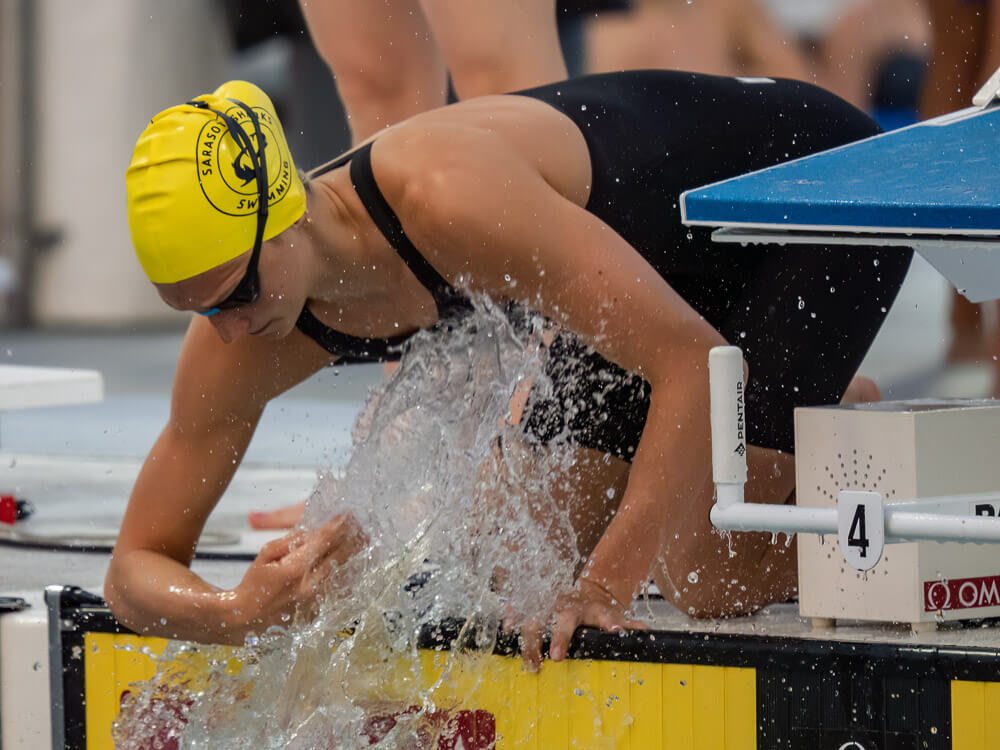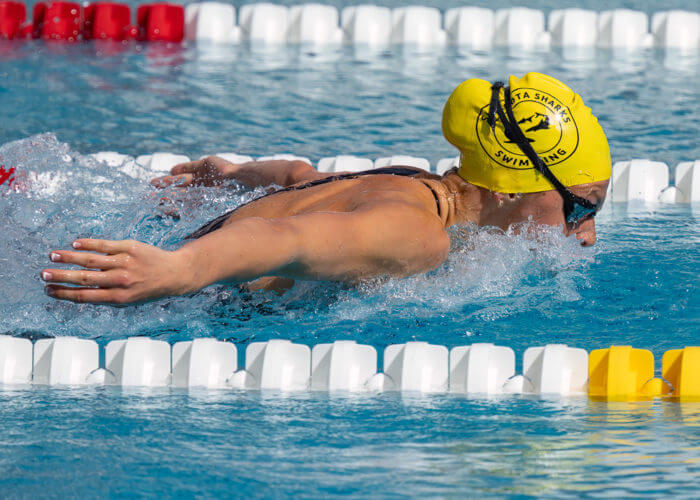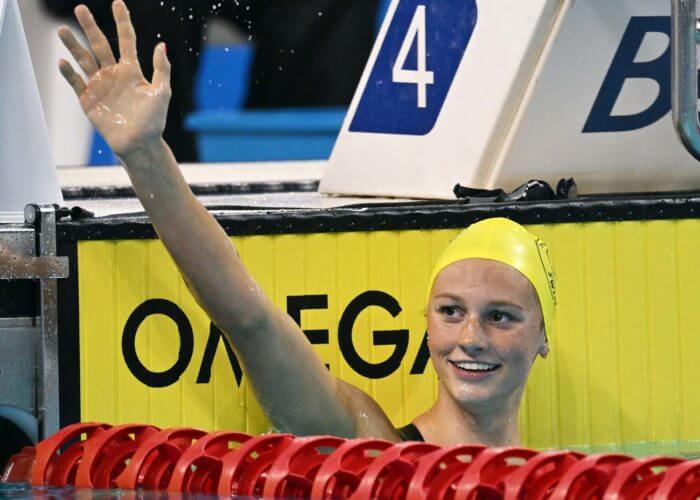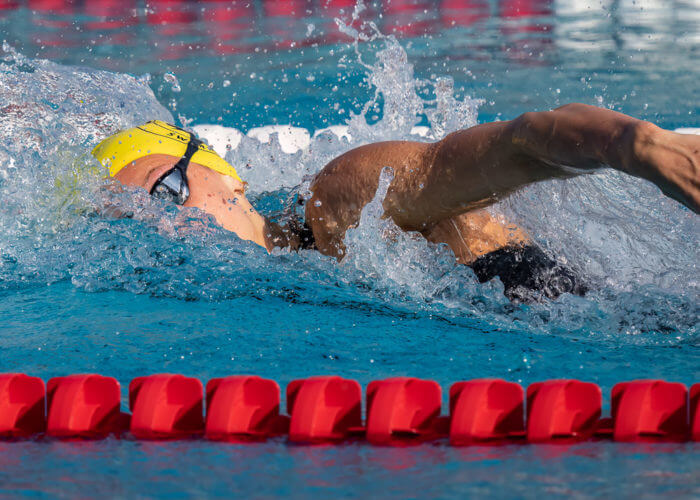Teen Star Summer McIntosh A Cross Between the Present and Future

Teen Star Summer McIntosh A Cross Between the Present and Future
Canada’s Summer McIntosh, only 16 years of age, occupies a moment between present and future. Improving with each passing competition, with an Olympic appearance and two World Championship gold medals to her name before she’s old enough to legally operate a motor vehicle, her present is special. Her future has no foreseeable ceiling, except to push boundaries.
Summer McIntosh didn’t know what to expect, but she at least had an idea of what to look for.
She and Maggie Mac Neil had a little time to talk it through before the Bell Canadian Swimming Trials in March, one world record holder sharing wisdom with a swimmer on a collision course with history sooner rather than later. How does one process swimming a distance and discipline faster than anyone in history? How does one wrap their mind around a 500-gram hunk of precious metal around one’s neck that is the manifestation of a decades-long professional quest? What does it mean to have your title changed to something like “world record holder” forever onward?
By the time McIntosh set her first world record on the night of March 28, covering 400 meters of freestyle in 3 minutes, 56.08 seconds at the Toronto Pan Am Sports Centre, she hadn’t let herself grapple with those questions yet, not in the way her veteran mentor has.
But McIntosh knew what she wanted out of her world-record moment, if it ever came. She knew how to find the friends and family so instrumental to her journey in the stands, how to bask in the adulation of a hometown that she had left for training and returned to like a conquering if softspoken hero, how to share essentially her first moment as world record holder in an on-deck embrace with her close friend and teammate, Victoria Raymond.

Photo Courtesy: Peter H. Bick
By the end of the meet, all that she’d accomplished hadn’t quite sunk in. But the 16-year-old, savvy beyond her years, knew enough to plot the next steps. “I don’t think things like this ever fully sink in,” McIntosh said after her first world record. “I definitely want it to eventually, but it definitely hasn’t sunk in yet.”
For now, she’ll have to settle for this: It’s sunk in for the rest of the world just how exceptionally outstanding McIntosh is. In short order, she’s gone from an accomplished junior swimmer to a prime figure in the illustrious Canadian program to the author of one of the most singularly dominant weeks of swimming ever. In half an Olympic cycle, she’s morphed from promising talent to gold-medal contender—even in events that are the province of some of the sport’s titans, an echelon she could soon join.
“I really don’t focus on records that much, but it’s basically any athlete’s dream to get a world record or achieve something like that,” she said. “When it happened…I still think I’m in complete shock. It was such an incredible moment to share with all the Canadians in the stands and a bunch of my family and friends who were also on deck and in the stands.”
A TERRIFIC TORONTO TRIALS
What McIntosh achieved at the Pan Am Sports Centre enters rarefied air among the most outstanding swim meets ever assembled. A Trials meet can’t occupy the same lofty place in history as Michael Phelps in Beijing, Mark Spitz in Munich or Emma McKeon in Tokyo. But for time and for history, the case is compelling:
- Five events.
- Five national records.
- Two world records.
- Five world junior records.
It began on opening night with a world record in the 400 free, going 3:56.08 to topple Australia’s Ariarne Titmus’ mark from 2022 by 32-hundredths of a second. With a fortuitously scheduled day off to process that swim, she returned two nights later to lower her Canadian record in the 200 individual medley to 2:06.89, skipping the 2:07s completely.
In succession, she slashed 35-hundredths off her 200 butterfly national mark to 2:04.70 and trimmed 2-tenths off her 200 free record to 1:53.91. In between, she unseated Hungary’s Katinka Hosszu’s world record in the 400 IM by a half-second to 4:25.87.
The breadth of her success at Trials marks a watershed. McIntosh has set records before, and she’s performed at high-pressure meets with the stakes of international team selection (though Canadian Trials for the World Championships was hardly make-or-break). But to maintain such a high level through a lengthy meet, especially at her age, is a sign of unprecedented maturity. It’s proof of the hard work she’s done on the mental aspects of racing as well as the physical.
“I think it’s kind of something I’ve learned to do at the big meets I’ve been at—not to snap out of what I’m focusing on and try to stay in the zone as much as possible,” she said. “I really learned what it takes to do that. I’ve started to kind of master it, but it’s something you definitely have to think about.”
A SUNSHINE STATE SWITCH
In sketching out the contours of the Canadian swimming landscape, John Atkinson focuses on the complexities. Swimming Canada’s High Performance Director likes to sort athletes into six broad buckets based on training location—in university programs in Canada or the NCAA; in clubs in Europe, the United States or Canada; or under Swimming Canada’s direct observation at its two High Performance Centres.

Photo Courtesy: Swimming Canada/Scott Grant
Already in her young career, McIntosh has excelled in three of those domains. Atkinson sees her as a salient example of Canada developing swimmers with the help of guidelines rather than mandates to help each individual “do their own thing and their own plan and be on their path.”
McIntosh found her way onto the national radar at Etobicoke Swim Club, one of Canada’s premier clubs. Her performances at age 12 in the summer of 2019, finaling in senior national events and rewriting national age group records, gained Swimming Canada’s notice. Her profile—and struggles for pool access as the COVID-19 pandemic headed into its second year—led to an invitation to the Ontario High Performance Centre, where she trained ahead of her Olympic debut in Tokyo in 2021.
The Olympics didn’t yield a medal, but that’s about the only drawback from McIntosh’s Tokyo showing. She finished ninth in the 200 free, fourth in the 400 free and fourth in the 800 free relay. The latter two were Canadian records, finishing behind a stacked distance podium in the 400. As an appetite-whetter, Tokyo was just about ideal.
After the Games, McIntosh plotted a novel course, shifting her training full time to the Sarasota Sharks in Florida. There’s no arguing with the results under the tutelage of Coach Brent Arckey, and the challenge of living away from home may well be helping McIntosh grow in crucial ways outside the water.
“It’s for sure a change from living in Toronto, because this is my home and always will be,” she said. “I think everyone supporting me and surrounding me has done an excellent job with me being able to handle it. I owe it all to my family and my friends, but especially my mom and dad and sister. They’ve done so much for me to be able to live in Florida full-time, and I’m so grateful to them for it.”
The McIntosh family is no stranger to sporting sacrifices. Summer’s mom, Jill (née Horstead), swam at the University of Florida and internationally for Canada, including at the 1984 Olympics. Summer’s older sister, Brooke, is an elite pairs figure skater who has won a national junior title and medaled at the Canadian senior level and World Junior Championships.
“NINE DAYS IN PARIS”
Perhaps the hardest aspect of crafting McIntosh’s journey to Paris is winnowing her program of events. While Atkinson approaches each national team athlete as “a project of one,” McIntosh’s project may be the only one with sport-defining potential.
McIntosh’s Trials program would be daunting at a major international event, with semifinals and relays. In addition to the five Trials swims, she’s a shoo-in for the 800 freestyle relay and also possesses a formidable 800 free, which she swam in Tokyo. (She finished 11th there, though she dropped a best time of 8:20.19 in February, which Atkinson brought up unprompted.) She won gold in the 200 fly and 400 IM at Worlds, then both IMs at the Commonwealth Games in the summer of 2022, plus a pair of silvers in the 400 free.

Photo Courtesy: Peter H. Bick
McIntosh is early enough in the process that she’s not crossing any swims off her list—her entry in the Atlanta Classic in May, for instance, was aimed at attacking off-events. She said her goal remains “improving in as many events as possible,” with a selection to come late on.
“I can only really guess or brainstorm what that would look like,” she said. “I’m still taking it day by day in training and trying to improve in all my main events and even some of my off events, because just to be a well-rounded swimmer is something I want to be, and I still want to achieve. For Paris, I think that will depend on which events will continue to improve the most, and that will make my decision clear.”
Guidance from Atkinson and her coaches will factor in, as does the Paris calendar. The final of the 200 free and 400 IM fall on the same night, for instance, as will the finals of the 200 IM and 800 free. The 200 fly final and 800 free relay present a daunting double as well. Factor in rest and recovery—the goal is to have McIntosh at her best as often as possible—and you have what Atkinson terms “a jigsaw puzzle.”
“You have to work with the coach, the athlete, talk to them, listen to what they’re thinking, ask questions, prod, maybe ask, ‘Well, have you considered this?’” he said. “And you have to work at the event order—what the Worlds program is, what the Olympic Games program is, consider where recovery needs to come in because you want to be swimming distance as well on Day 9 as you are on Day 1. It’s a long time to maintain sustained performance.”
McIntosh’s performances in Toronto may have seemed like a whirlwind, but the girl at the center seemed strategically unmoved. She admitted it was tough to get to sleep the night of her 400 free record, though she didn’t have a prelims swim the next morning to concern herself with.
Feeling the emotion without getting swept up is one of those skills she anticipates will take time to cultivate. But that recognition—at such a young age and with the support system assembled—allows her to use the momentum of this period to keep pushing forward.
“I try not to let races be what gives me confidence,” McIntosh said. “I try to let the training give me confidence, and that’s what I’ve always tried to do. Obviously, it’s very nice to do what I just did, but I try to focus on my training as what gives me confidence.”




Clear messages for those who want to achieve high performance.